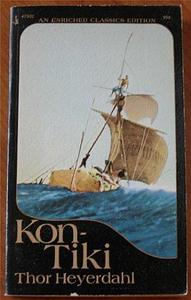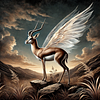Take a photo of a barcode or cover
That said, I echo other positive reviews of the book as a true seafaring tale. I could not put it down, and read it over the course of 24 hours. As a lover of the sea and everything in it, the tale of floating across the sea, and the descriptions of the life they encountered, were so enticing as to make my hair stand on end. I wholly recommend this to any lover of the sea. It now ranks up the with Far Tortuga for me.
One cool highlight from this book is that they tried to create the raft as similar as possible to those used by ancient civilizations. A lot of naval experts gave the raft no chance of crossing the Atlantic. But it turned out that all the things they mimicked from history books were crucial in keeping the raft adrift. For me this showed that we can easily misjudge the value and importance of old traditions and customs.
In order to give credence to his theory that the Polynesian islands were settled by a lost tribe from Peru, Thor Heyerdahl recreated the journey on his own primitive raft. He and five companions spent three months on the open seas letting current and wind direct their course.
Along the way, they had several interesting encounters with all manner of sea life. The simple descriptions made it easy to imagine what life was like on the raft.
I am... ambivalent, now, having read it. Basically one part positive, two parts negative.
Positive: it really is a riveting story. Six men in 1947 on a balsa wood raft, sailing from Peru to Polynesia. They have a radio and a sextant, and modern clothes and sleeping bags; but their raft is genuinely balsa wood, held together with rope. They have no particularly good way to steer. It's made (apparently) as accurately as they could to match the descriptions from Spanish conquerors to the area. They truly have remarkable experiences, and they went 100-odd days crossing the Pacific. That is epic, as are their encounters with a whale shark, various other wildlife, storms, and just life in general. For that aspect, I don't regret reading it.
The negatives... well. To start with the journey itself - no, even before. The description of cutting down massive old balsa trees for the construction of the raft had me cringing. Then there's the seemingly-wanton 'fishing' while they're at sea: they're hooking and killing far more shark and other fish than they eat, which is just awful. (It is kind of hilarious to read of the flying fish just randomly landing on the boat, I will admit, and eating those makes sense - especially when they've been piling up throughout the night.) Also, Thor at least is married and... in the entire book, no mention of the wife. Ever. Not even before the journey, when he's in America trying to convince people of his theories.
And, yes, here's the rub, the sticking point, the main problem. Thor goes on this journey to show that it would have been possible for humans to sail from South America to Polynesia, and thereby be the progenitors of at least some of the people living in those islands, and therefore responsible for the impressive statues and pyramids and other 'advanced' things that can be found on some islands. But not the Inca, oh no, and not the Olmec, or anyone else you might have heard of: rather, it was a white, bearded race who apparently came before the Inca. And were more civilised, and taught them everything and then got chased off. So... yeah. His entire premise is deeply, deeply racist. This also comes out in descriptions of the Polynesians and others. I'm privileged because I'm white; if a person of native South American - anywhere on that continent - or Polynesian or, I'm afraid, Jewish descent said they were thinking of reading this, I would want to have a good long conversation with them so that they knew what they were getting into. This absolutely means the entire book is problematic, and being a ripping adventure yarn in no way excuses it. It is written in 1947, which offers some context for why Heyerdahl thought it was appropriate to write such things and the publishers apparently had no problem with it - hey, no Polynesian is likely to read it, amiright? and why would they complain even if they did? etc.
Did it have fun bits to read? Totally. Is the book problematic? Absolutely. Did I buy the other two books he wrote, to try and show that Egyptians AND Mesopotamians got to South America by boat? I absolutely did and fully intend to read them to rip the theories to shreds.






